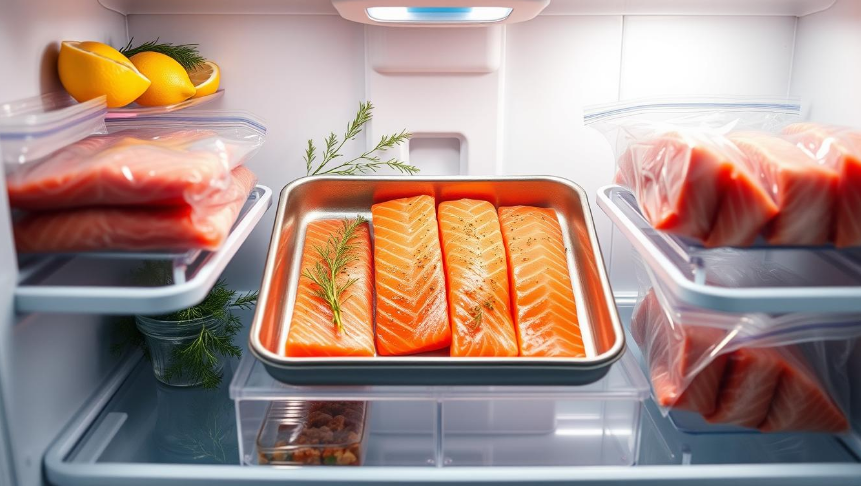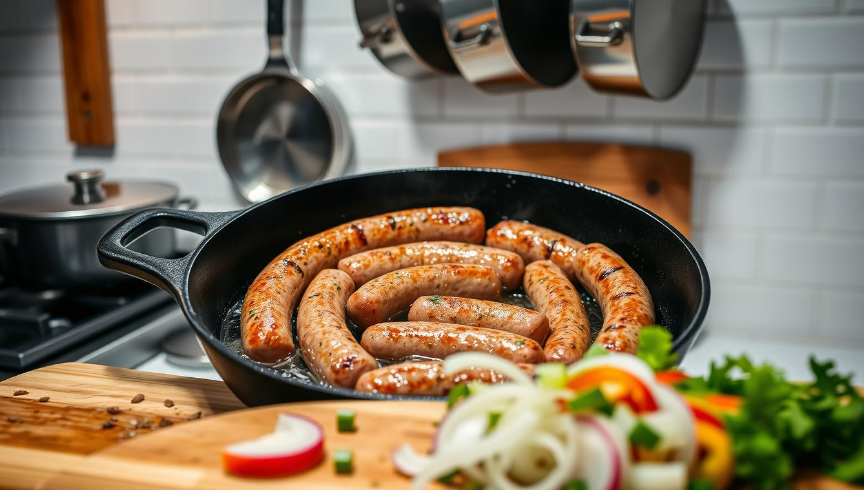How long is salmon good for in the fridge?
Table of Contents
When you bring home a fresh salmon, you might wonder how long it stays good in the fridge. It’s important to know how long salmon lasts to keep it fresh and safe. This way, you can enjoy its rich flavor and health benefits.
Knowing how long salmon lasts in the fridge helps you plan meals and avoid wasting food. In this article, we’ll look at what affects salmon’s freshness. We’ll also share tips on how to store it to keep it fresh longer.
Introduction to Salmon Storage
Understanding how to store salmon is key to keeping it fresh. The right storage methods can greatly affect the quality of your salmon. By following a few simple steps, you can enjoy your salmon for a longer time and keep its nutritional value.
Key Takeaways
- Understanding the shelf life of salmon is crucial to maintaining its freshness and safety
- Proper storage techniques can significantly impact the freshness and quality of salmon
- Knowing how long does salmon last in the fridge helps plan meals and avoid food waste
- Storage temperature and handling affect the freshness of salmon
- Following simple storage guidelines can help maintain the nutritional value of salmon
- How long is salmon good for in the fridge depends on various factors, including storage conditions and handling
Understanding Salmon Storage Basics
Proper handling and storage are key to keeping salmon fresh and safe. You might ask how long does cooked fish last in the fridge or how long does salmon keep in freezer. But the secret to keeping it fresh lies in knowing the basics of salmon storage. Temperature, handling, and storage conditions all play a big role in salmon’s quality and safety.
To store salmon right, you need to know about refrigeration and freezing. Each has its own rules and best practices. For example, refrigeration is best for short storage, while freezing is for longer. Knowing the right storage temperature is crucial for keeping salmon quality and safe.

Different Storage Methods
- Refrigeration: Store salmon in a sealed container at a temperature of 32°F (0°C) or below.
- Freezing: Wrap salmon tightly in plastic wrap or aluminum foil and store at 0°F (-18°C) or below.
Factors Affecting Salmon Freshness
Temperature, handling, and storage conditions all affect salmon’s freshness. It’s important to handle salmon gently and keep it in a clean, dry place. This prevents contamination and spoilage. By following the right storage tips, you can keep salmon fresh and safe for longer.
How Long Is Salmon Good for in the Fridge?
Wondering how long is salmon good for in the fridge? It depends on several things. These include the salmon type, fridge conditions, and how you handle it. Fresh salmon usually lasts 1-2 days. Cooked salmon can stay good for 3-4 days.
To figure out how long does salmon last in the fridge, think about these points:
- Storage temperature: Salmon needs to stay at 40°F (4°C) or colder.
- Handling practices: Handle salmon carefully to avoid damage and contamination.
- Storage conditions: Keep it in a covered container, away from strong-smelling foods.
Always check the salmon for spoilage signs. Look for off smells, slimy texture, or mold. If you see these, it’s safer to throw it away.

Proper storage and handling can make your salmon last longer. Always check it before eating. If unsure, it’s safer to throw it away for food safety.
Storage Time for Raw Salmon
Storing raw salmon requires careful consideration. The type of salmon, storage conditions, and handling practices all matter. Fresh salmon usually lasts 1-2 days in the fridge. Store-bought salmon might last longer due to processing and packaging.
To keep your raw salmon fresh, check it often for spoilage signs. Look for sliminess, off-odors, and color changes. Knowing how to store it right is key to keeping it safe and tasty. You might also wonder how long is cooked salmon good for or how long does cooked fish last in the fridge. But first, let’s focus on raw salmon storage.
Fresh Salmon Storage Duration
The storage time for fresh salmon varies. It depends on the salmon type and storage conditions. For example, sealed containers in a cool fridge extend its life. Leaving it uncovered or at room temperature shortens it.
Store-Bought vs. Fresh-Caught Salmon
Store-bought salmon often lasts longer than fresh-caught due to processing. Yet, fresh-caught salmon can be safe and fresh if stored correctly. Proper storage is crucial for both to ensure quality and safety.
Signs of Fresh Salmon
Regularly checking your salmon for spoilage is essential. Look for sliminess, bad smells, and color changes. Always consider the storage time to know how long does cooked fish last in the fridge or how long is cooked salmon good for if you cook it.
Proper Storage Methods for Fresh Salmon
Storing fresh salmon right is key to keeping it fresh and safe. You can keep it in the fridge for a while, depending on how you store it. The type of salmon and storage conditions affect how long it stays good.
To freeze salmon, it’s important to know how long it lasts. Freezing can extend its shelf life for months. Here are some tips for storing fresh salmon:
- Store salmon in a sealed container, covered with plastic wrap or aluminum foil.
- Keep salmon at a consistent refrigerated temperature below 40°F (4°C).
- Freeze salmon at 0°F (-18°C) or below to maintain its quality.
By following these storage methods, you can enjoy your fresh salmon for a longer period while maintaining its quality and safety.
Cooked Salmon Storage Guidelines
Storing cooked salmon right is key to keeping it fresh and safe. You might ask how long is cooked salmon good for or how long does cooked fish last in the fridge. Cooked salmon can stay in the fridge for 3-4 days.
Cool cooked salmon to a safe temperature within 2 hours of cooking. Place it in a shallow container and chill it at 40°F (4°C) or below. Ice packs can help cool it faster.
- Store it in a sealed container to prevent contamination and other flavors from affecting the salmon.
- Label the container with the date it was cooked, so you can keep track of how long it’s been stored.
- Reheat the salmon to an internal temperature of 165°F (74°C) to prevent foodborne illness.
By following these guidelines, you can enjoy your cooked salmon while maintaining its quality and safety. Always check the salmon for signs of spoilage before eating it. Discard it if you notice any unusual odors, slimy texture, or mold growth.
Freezer Storage Options for Salmon
Storing salmon in the freezer is a great way to keep it fresh and safe. But, how long does salmon keep in freezer? The time it lasts depends on how you store it and its condition before freezing. Usually, salmon can stay in the freezer for months. It’s key to freeze and thaw it correctly to keep it good and safe.
To freeze salmon, use airtight containers or freezer bags. Make sure to label and date them for easy tracking. Also, remember that how long is salmon good for in the fridge before freezing matters. Freezing it as soon as you buy or catch it is best.
Here are some tips for freezing and thawing salmon:
- Freeze salmon at 0°F (-18°C) or below to stop bacteria growth
- Thaw frozen salmon in the fridge, cold water, or microwave safely
- Use frozen salmon within a few months for the best taste and safety
By following these tips, you can enjoy salmon for longer while keeping it fresh and safe. Always check the salmon for spoilage before eating it, even if it’s been frozen.
Signs Your Salmon Has Gone Bad
It’s important to check if your salmon has gone bad. This is especially true if you’re not sure how long cooked salmon lasts. Knowing this helps keep your salmon safe and fresh.
Identifying Spoilage
Look for signs like sliminess, color changes, or mold on the salmon. A strong, bad smell is another clue. If the salmon feels soft or mushy, it might be spoiled.
Checking for Spoilage
Here are some ways to check for spoilage:
- Check the salmon’s appearance for any visible signs of mold or sliminess.
- Perform a smell test by giving the salmon a sniff. If it has a strong, unpleasant odor, it may be spoiled.
- Check the texture of the salmon by touching it gently. If it feels soft or mushy, it may be spoiled.
By knowing these signs, you can make sure your salmon is fresh. This way, you can enjoy it within the right time frame.
Best Practices for Maintaining Salmon Freshness
To keep your salmon fresh, it’s key to know how long it stays good in the fridge and freezer. Proper storage is vital for keeping salmon quality and safe. You need to understand storage times for raw salmon and how to spot fresh salmon.
Proper Packaging Methods
Proper packaging means storing salmon in airtight containers or freezer bags. Make sure to label and date them. This helps you keep track of how long the salmon has been stored, ensuring you use the oldest first.
Temperature Control Tips
Temperature control is also key. Salmon should be stored at a consistent refrigerated temperature to prevent spoilage. Keep your fridge at 40°F (4°C) or below to keep salmon fresh. By following these tips, you can enjoy your salmon longer and keep it safe and quality.
- Store salmon in airtight containers or freezer bags
- Label and date the containers
- Keep the refrigerator at a consistent temperature
By following these tips, you can keep your salmon fresh and safe to eat, whether in the fridge or freezer. Always check the salmon for signs of spoilage before eating. Discard it if you notice any unusual odors, slimy texture, or mold growth.
Common Salmon Storage Mistakes to Avoid
Storing salmon correctly is key for food safety and quality. Many people don’t know how long cooked salmon stays good. It can last 3 to 4 days in the fridge. Always check for spoilage before eating.
Storing salmon at the right temperature is also crucial. It should be kept at 40°F (4°C) or below. This prevents bacteria and keeps salmon fresh longer. Knowing how long cooked fish lasts in the fridge is important too.
Here are some common mistakes to avoid with salmon storage:
- Storing salmon at room temperature for too long
- Not checking for signs of spoilage before consuming
- Not storing salmon in a covered container
- Not labeling and dating stored salmon
Avoiding these mistakes helps keep your salmon fresh and safe. Always check for spoilage and store it at the right fridge temperature. If unsure about how long cooked salmon lasts, it’s safer to discard it.
Special Considerations for Different Salmon Preparations
Storing salmon depends on how it’s prepared. You might ask how long does salmon keep in freezer or how long is salmon good for in the fridge. The answer changes based on the preparation. For example, smoked salmon needs a different storage method than fresh or cooked salmon.
To keep your salmon safe and tasty, consider these special tips for different preparations.
- Smoked salmon should be stored in airtight containers to prevent drying out. It’s important to check the storage time to avoid over-storing.
- Canned salmon should be kept in a cool, dry place, away from sunlight. Following guidelines for how long is salmon good for in the fridge is key to avoid spoilage.
- Marinated salmon needs careful handling and storage to prevent contamination and spoilage. Knowing how long does salmon keep in freezer is crucial for safe storage.
Understanding these special tips helps you enjoy your salmon while keeping it safe and fresh. Always check the storage time and follow guidelines to get the best from your salmon.
Health and Safety Considerations
When you handle and store salmon, it’s key to think about health and safety. This is to avoid getting sick from food. Knowing how long cooked salmon stays good and how long cooked fish lasts in the fridge is important.
Good handling and storage can lower the risk of getting sick. You should keep cooked salmon in a sealed container at a cool temperature. It’s best to eat it within a few days. Knowing how long cooked fish lasts in the fridge helps keep it safe and tasty.
Some important health and safety tips include:
- Storing cooked salmon in a clean and sanitized area
- Labeling and dating stored salmon to keep track of its age
- Cooking salmon to at least 145°F (63°C) to kill harmful bacteria
By following these tips and being careful about how long cooked salmon stays good, you can enjoy safe and healthy meals. Always remember to handle and store salmon properly to avoid getting sick.
Conclusion
Storing and handling salmon right is key to keeping it fresh and tasty. Knowing how to store it, from fridge to freezer, helps you enjoy salmon longer. Always check your salmon for signs of spoilage, like smell, look, and feel.
With the right storage, you can enjoy salmon’s health benefits and taste. Whether it’s fresh, smoked, canned, or marinated, following these tips helps. So, next time you have salmon, use what you’ve learned for a great experience.
FAQ
How long is cooked salmon good for in the fridge?
Cooked salmon can stay in the fridge for 3-4 days. Make sure it’s in an airtight container. Keep it cold to keep it fresh and safe.
How long does raw salmon last in the fridge?
Raw salmon can last 1-2 days in the fridge. But, it depends on the type of salmon and how it’s stored.
How long does salmon last in the freezer?
Raw salmon can last 6-9 months in the freezer. Cooked salmon can last 3-4 months. Store it in an airtight container to keep it fresh.
What are the signs that salmon has gone bad?
Bad salmon looks slimy or dull. It smells fishy and feels soft or mushy. If you see these signs, throw it away to avoid getting sick.
How can I best maintain the freshness of my salmon?
Keep salmon fresh by storing it at 40°F or below. Use airtight packaging and don’t leave it out too long. Check it often for signs of spoilage.
What did you think of our recipe?
There are no reviews yet. Be the first one to write one.





